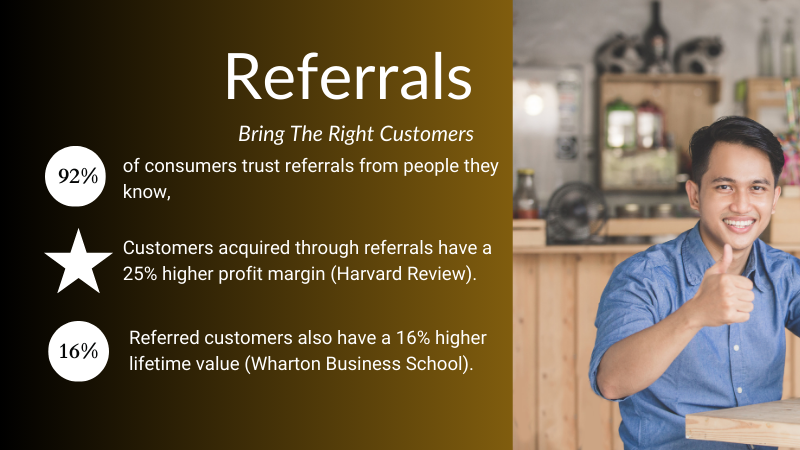Introduction
In today’s highly competitive market, customer referrals have become a cornerstone for business growth. A strong customer referral program can turn satisfied customers into brand advocates, driving new business without the need for expensive marketing campaigns. Yet, many businesses struggle to find effective ways to encourage their customers to refer others. In this blog post, we’ll explore innovative and lesser-known strategies to motivate your customers to become your most enthusiastic promoters.
Key Takeaways
- Referrals are Essential for Growth: Referrals are a powerful tool for acquiring new customers who are more likely to trust your business and become loyal clients.
- Innovative Referral Strategies: Going beyond traditional referral programs can make your business stand out. Personalised gifts, contests, and strategic partnerships are effective ways to encourage referrals.
- Build a Referral-Friendly Culture: Fostering a culture that values exceptional customer service and team collaboration can naturally lead to more customer referrals.
- Understand Referral Motivators: Knowing what motivates your customers to refer others can help you tailor your approach, making your referral program more effective.
- Measure and Optimise: Continuously track and analyse your referral efforts to understand what works best and refine your strategy accordingly.
Table of Contents
Why Customer Referrals Matter More Than Ever
Referrals are not just about getting new customers; they’re about getting the right customers. According to a Nielsen study, 92% of consumers trust referrals from people they know, making referrals the most trusted form of advertising. Referred customers also have a 16% higher lifetime value compared to non-referred customers, as found in a study by the Wharton School of Business. These statistics highlight the power of referrals in building a loyal customer base that drives sustainable growth.

Innovative Ways to Encourage Customer Referrals
While traditional methods like referral discounts or loyalty points can work, they’re becoming increasingly common. To stand out, consider these fresh approaches:
- Personalised Thank You Gifts: Instead of offering generic discounts, send personalised thank you gifts that resonate with your customers’ interests. For example, if you know a customer loves coffee, send them a high-quality coffee blend as a thank you for their referral. This personal touch not only shows appreciation but also strengthens the relationship, making them more likely to refer others.
- Create a Referral Contest: Run a referral contest with attractive prizes. For instance, a travel company could offer a free vacation package to the customer who refers the most friends in a month. This competitive element can spur more referrals as customers vie for the top spot.
- Referral Partnerships: Partner with complementary businesses to create a cross-referral program. A gym could partner with a local health food store, offering discounts to each other’s customers who make referrals. This expands your reach and taps into a new customer base.
- Feature Your Referrers: Highlight customers who refer others in your marketing materials, such as social media shoutouts or a “Customer Spotlight” section on your website. This recognition can motivate others to refer as they seek to be featured and appreciated.
- Automate the Referral Process: Make it easy for customers to refer friends by automating the process. Use referral software that integrates with your CRM and email marketing tools to send out personalised referral requests and track the results.

Building a Customer Referral Culture
Beyond specific tactics, fostering a referral culture within your business is crucial. Here’s how to do it: Train Your Team: Ensure every team member understands the importance of customer referrals and how to ask for them naturally during customer interactions. Equip them with scripts and tools to make the process seamless. Deliver Exceptional Customer Service: Customers are more likely to refer others when they have a positive experience. Prioritise customer satisfaction and address any issues promptly to turn detractors into promoters. Ask at the Right Time: Timing is everything. Ask for referrals when customers are most satisfied—after a positive purchase experience, a great customer service interaction, or when they share positive feedback.
Overcoming Referral Hesitation
Some customers may hesitate to refer others, even if they’re satisfied with your service. Here’s how to address common concerns: Make It Easy: Simplify the referral process. Provide shareable links, pre-written messages, and clear instructions. Reassure Privacy: Assure customers that their referrals’ privacy will be respected. Make it clear that you won’t spam or pressure their friends. Highlight the Benefits: Clearly communicate the benefits for both the referrer and the referred. Ensure it’s a win-win situation for everyone involved.
Frequently Asked Questions (FAQs)
1. How do I ask my customers for referrals without being pushy?
Answer: The best way to ask for referrals without seeming pushy is to focus on timing and the value you provide. Ask for referrals when your customers are most satisfied, such as after a positive experience or a successful purchase. Be straightforward and polite, making it clear that referrals are a way to help others benefit from the same great experience they had.
2. What should I offer as an incentive for my referral program?
Answer: Effective incentives depend on your customer base and what they value. Common incentives include discounts, free products or services, and cash rewards. However, personalised gifts or exclusive access to special events can also be very motivating. The key is to offer something that is meaningful and adds value to your customers.
3. How can I measure the success of my referral program?
Answer: To measure the success of your referral program, track key metrics such as the number of referrals made, conversion rates of referred customers, and the overall customer lifetime value of referred customers. Tools like CRM software and referral tracking platforms can help you gather and analyse this data to optimise your program for better results.
Final Thoughts
Encouraging customers to refer others requires more than just a referral program—it requires a thoughtful approach that considers what motivates your customers. By personalising incentives, creating engaging contests, forming strategic partnerships, and fostering a referral-friendly culture, you can turn satisfied customers into passionate advocates for your brand. Remember, the key to a successful referral strategy is making it easy, rewarding, and mutually beneficial for everyone involved. Speak soon Len
- Standard Operating Procedures: Your Ultimate Guide to Streamlining Business Efficiency - September 5, 2025
- Brutal Truth: Your Customer Perception Is Sabotaging Your Success (Here’s The Proof) - July 25, 2025
- The Counter-Intuitive Customer-Centric Culture Strategy That Changes Everything - July 11, 2025
